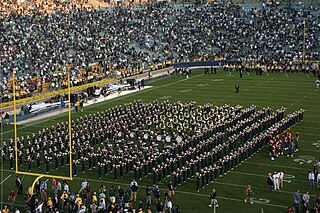 W
WThis is a list of marching bands. Major types include collegiate and military. At least 16 U.S. colleges have had scramble bands, which are also included in this list.
 W
WThe Band of the Fighting Irish is the marching band of the University of Notre Dame. Over 300 members of the band represent nearly every field of study, and include students from across the United States as well as from overseas.
 W
WThe Brown University Band is the official band of Brown University. Like all Ivy League bands except Cornell's, it is a scatter band. The Brown Band began performing on ice skates in 1970, and claims to be the world's best ice skating scatter band. It is the source of much of Brown's school spirit, and often appears as a public representation of Brown to the Providence community and to other universities. The Band is present at all home and away football games, various basketball and hockey games, as well as Commencement and other special events each year. It receives funding from Brown's Undergraduate Finance Board.
 W
WThe University of California Marching Band, usually shortened to Cal Band, is the marching band for the University of California, Berkeley. While it is administered under the auspices of the university, the Cal Band is student-run and represents Cal at sporting events and social gatherings. The name of the band is "The University of California Band" by the constitution, but is typically called "The University of California Marching Band" or "The Cal Band". When the band marches out of Memorial Stadium's North Tunnel for football pre-games, it is referred to as "The Pacesetter of College Marching Bands, the Pride of California".
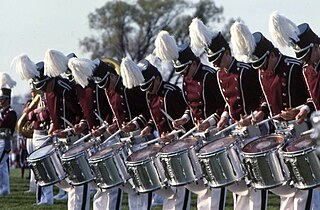 W
WThe Collegiate Marching Band Festival, also called the CMBF, is an annual event held in Allentown, Pennsylvania, United States, which showcases college and university marching bands of all sizes and styles from across the Northeastern United States. First held in 1996, the event typically takes places in early October at J. Birney Crum Stadium, a renowned venue for marching band and drum corps performances. The festival is not a competition, but rather an opportunity for fans and band members alike to view bands that perform a variety of shows and exhibit different performance styles.
 W
WThe Columbia University Marching Band (CUMB) was the marching band of Columbia University. Founded in 1904, it claimed to be the first college or university marching band in the United States to convert to a scramble band format, making the switch in the 1950s. Today, all of the Ivy League bands, as well as the Stanford Band, William & Mary Pep Band, and Marching Owl Band have adopted the scramble band style.
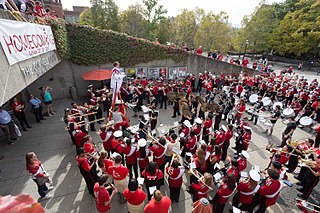 W
WThe Cornell Big Red Marching Band is the only corp style marching band in the Ivy League. It performs at all home, and most away, Cornell Big Red football games. In addition, the band has performed at halftime for numerous National Football League and Canadian Football League games, and began a tradition of an annual Spring Concert in 2006.
 W
WThe Dartmouth College Marching Band is an organization of Dartmouth College.
 W
WThe Harvard University Band (HUB) is the official student band of Harvard University. The Harvard Wind Ensemble, the Harvard Summer Pops Band, and the Harvard Jazz Bands also fall under the umbrella organization of HUB. Currently, the band plays for all football games as well as home men's and women's ice hockey games. Occasionally it plays at men's and women's basketball games. The uniform for both football games and other formal appearances consists of a crimson wool HUB blazer worn over a white shirt with a black HUB logo tie, black pants, and black shoes. In the early days of the Band, white sailor hats and khaki pants were worn. For hockey games, the band wears a custom Harvard Band hockey jersey, modeled after the home jerseys for men's hockey, which features images of Bertha on the sleeves. Band alumni, known as crusties, maintain strong ties to the HUB, sometimes continuing to act as regular members well after graduating from the University. Illegitimum non carborundum (INC) is the HUB motto. Written correspondence from HUB or HUB members is frequently signed with INC.
 W
WFormed in 1845, the Holy Cross Crusaders Marching Band (HCMB) is one of the oldest organizations at The College of the Holy Cross in Worcester, Massachusetts, USA, and one of the oldest college bands in the United States. The Crusaders Marching Band first began performing at football games in 1910 and the band's role has expanded significantly since to include other athletic appearances, performing at all home football games, selected away games, in exhibition at high school band competitions, and at various events throughout the country. In the spring, the marching band converts into the Holy Cross Crusader Pep Band and plays at all home basketball games, and travels with the teams to the NCAA tournament. The Marching Band performs at Fitton Field while the Pep Band plays in the Hart Center.
 W
WMarching Mizzou, M2, or The Big 'M' of the Midwest is the performing marching band for the University of Missouri, founded in 1885 as a college military band. Originally consisting of only 12 members, it is now the largest student organization on the MU campus, drawing students from nearly every major. Marching Mizzou performs at all home football games of the Missouri Tigers football team, in addition to other university events; and expanded Mini Mizzou travels to two away games per season, while the entire band regularly follows the team to conference championship games and bowl games. Marching Mizzou's signature drill "Flip Tigers" has been a well-known tradition of its pre-game show since 1960. It is instructed by University of Missouri School of Music faculty.
 W
WThe Marching Southerners is the marching band of Jacksonville State University in Alabama. Composed of students from all over the country, the Southerners and Marching Ballerinas perform for thousands each season.
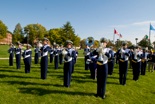 W
WThe Marian University Marching Band, is the official marching band of Marian University in Indianapolis, Indiana. The marching band is the largest student organization on campus and the university's largest for-credit course. Under the leadership of Dr. Sid Hearn, the Marian University Marching Band took the field for the first time on September 19, 2009.
 W
WThe Million Dollar Band is the official marching band of the University of Alabama. Founded in 1912, the Million Dollar Band is the largest student organization at the University of Alabama. The band performs during pregame and halftime of every home and neutral-site Alabama football game; it also supplies at least a pep band to every away football game, as well as home men's basketball, women's basketball, women's gymnastics, and volleyball games. In 2003, the band was awarded the Sudler Trophy, recognizing it as the top college band in the United States.
 W
WThe Minnesota State University Marching Band is the marching band of Minnesota State University, Mankato. The band generates enthusiasm and excitement by promoting school spirit and morale. The group performs at home football, hockey, and basketball events. The Maverick Machine consists of five ensembles including the marching band, drumline, color guard, pep band, and the indoor winds, the first collegiate WGI winds group in Minnesota.
 W
WThe Oregon Marching Band (OMB) is the marching band of the University of Oregon in Eugene, Oregon, United States. With over 250 members, it is the largest student organization on campus, and its members come from nearly every department and major at the university. The marching band serves as the foundation for the larger Oregon Athletic Bands organization that includes the Oregon Basketball Band, Winter Drumline, and the Green and Yellow Garter Bands.
 W
WOregon State University Marching Band, ("OSUMB"), is the marching band of Oregon State University, known as the "Spirit and Sound of OSU." The band was established in 1891. It is one of the oldest bands in the Pac-12 and the primary athletic band at Oregon State. In addition to the Oregon State University Marching Band, other athletic bands include Basketball Band, Rhythm & Beavs, Rhythm & Beavs: Travel Band, the Away Game Pep Band, Alumni Band, Gymnastics Band, and Bar Band. All band members are required to participate in marching band before they may be eligible to participate in any of the other athletic bands Oregon State offers.
 W
WThe University of Pennsylvania Band is among the most active collegiate band programs in the U.S. The organization is a part of the Department of Athletics at the University of Pennsylvania. Like most of the other 50 performing arts groups on the Penn Campus, it has no affiliation with any academic department and is sponsored by the Vice Provost's Office for Undergraduate Life. Typically ranging between 80 and 120 members every year, it is among the largest and most active student-run organizations on campus, performing up to 100 times during the academic year. Like most of the Ivy League Bands, the Penn Band is a scramble band.
 W
WThe Princeton University Band serves as the marching band and pep band of Princeton University. Like most other Ivy League bands, it is a scramble band. To members and fans, it is often known as the PUB or simply The Band. Many alumni refer to it as the Tiger Band.
 W
WThe Sonic Boom of the South is the marching band of Jackson State University (JSU) located in Jackson, Mississippi.
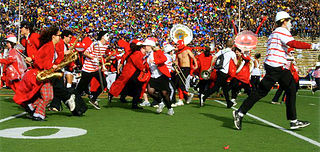 W
WThe Leland Stanford Junior University Marching Band (LSJUMB) is the student marching band representing Stanford University and its athletic teams. Billing itself as "The World's Largest Rock and Roll Band," the Stanford Band performs at sporting events, student activities, and other functions.
 W
WThe Sun Devil Marching Band (SDMB), also known as The Pride of the Southwest, is the athletic band of Arizona State University in Tempe, Arizona. The Sun Devil Marching Band motto is “Expect Great Things.” The acronym EGT is inscribed on a sign that hangs from the director’s podium towering over the band's practice field, and is a symbol of the high standards that band members strive to meet. The ASU Band program, which includes the Marching, Pep, and Dixieland bands, is a part of the Sun Devil Athletics department. The band is currently under the direction of Director of Athletic Bands James G. "The Hammer" Hudson, who took over the program in 2006. The Sun Devil Marching Band is a major ambassador for Arizona State University and the state of Arizona. Each year almost 500,000 people are entertained by the band, which plays at home football at Sun Devil Stadium and as a pep band for basketball games at Wells Fargo Arena, homecoming, bowl game parades, other community events in the Valley, across the country, and even abroad.
 W
WThe UC Davis Marching Band, organized in the fall of 2019, is the official University of California, Davis marching band. It is the successor to the student-run California Aggie Marching Band-uh!, which existed from the 1920s to 2019. In 2018, the Band-uh had roughly 250 members. It performed at home and away games to cheer on the UC Davis Aggies sports teams, marched in parades, and played at events on the UC Davis campus as well as in the surrounding Davis community.
 W
WThe 250-member UCLA Bruin Marching Band, known as The Solid Gold Sound, represents the university at major athletic and extracurricular events. During the fall marching season, the band performs at the Rose Bowl for UCLA Bruin home football games. Pregame shows by the band aim to build crowd energy and enthusiasm with traditional UCLA songs like "Strike Up the Band for UCLA", "Bruin Warriors", and "The Mighty Bruins". Throughout the game, the band performs custom-arranged rock and pop songs, as well as the traditional fight songs and cheers of the university. The UCLA Varsity Band appears at basketball games and other athletic contests in Pauley Pavilion. In 2018, the Bruin Marching Band was featured on the Muse album "Simulation Theory" performing the Super Deluxe version of the song "Pressure."
 W
WThe United States Merchant Marine Academy Regimental Band, designated as "George M. Cohan's Own", is a United States military band and college marching band that currently serves as the official marching band of the United States Merchant Marine Academy. The USMMA is the only service academy outside of the six senior military colleges, to maintain a cadet-staffed band for musical purposes. The band, unlike other musical units of service academies, is a co-located full-time ensemble. The band mainly provides ceremonial support for protocol ceremonies and athletic events. It performs A Life on the Ocean Wave, the official march of the USMMA and the Star Spangled Banner at all ceremonies. The modern band succeeded a full-time band that was deactivated following World War II. The band is currently led by Lieutenant Commander Bob Nixon, succeeding Captain Kenneth Force who served with the band from 1971 – 2016.
 W
WThe United States Naval Academy Band was officially founded in November 1852. Previously, there had been a band since the founding of the Naval Academy in 1845, consisting of a fifer and a drummer. The band consists of US Navy career musicians. The band is required to blend tradition and change into a wide variety of musical styles.
 W
WThe United States Naval Academy Pipes and Drums is a highland musical cadet unit of the United States Naval Academy (USNA). Currently, the 42-member military pipe band is the only active duty unit of its kind in any service of the Department of the Navy. The band group provides musical support to the academy's Brigade of Midshipmen as well as the larger city of Annapolis, Maryland. It is one of several service academies to maintain bagpipe bands, alsonside the West Point Pipes and Drums and the Virginia Military Institute Pipes and Drums. The USNA Pipe Band is one of the more recent of these types of bands, being established in 1996 with funding being provided by members of the Annapolis class of 1961. It was officially approved as a Brigade Support Activity (BSA) three years later.
 W
WThe University of Chicago Band is a pep band and a marching band for the University of Chicago. The Band was founded in 1898, five years after the university opened.
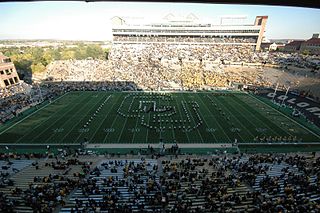 W
WThe Golden Buffalo Marching Band is the marching band at University of Colorado Boulder.
 W
WThe University of Delaware is a public land-grant research university located in Newark, Delaware. UD is the largest university in Delaware. It offers three associate's programs, 148 bachelor's programs, 121 master's programs, and 55 doctoral programs across its eight colleges. The main campus is in Newark, with satellite campuses in Dover, the Wilmington area, Lewes, and Georgetown. It is considered a large institution with approximately 18,200 undergraduate and 4,200 graduate students. It is a privately governed university which receives public funding for being a land-grant, sea-grant, and space-grant state-supported research institution.
 W
WThe University of Massachusetts Minuteman Marching Band (UMMB) is the marching band for the University of Massachusetts Amherst known for its drum corps style and nationally renowned percussion section. The Minuteman Band is also known for its use of dance routines, vocalists, electronics, and overall showmanship.
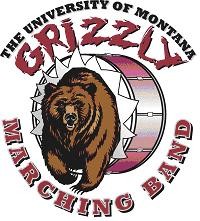 W
WThe University of Montana Grizzly Marching Band is the school band of the University of Montana. As of 2017, the band had about 130 members.
 W
WThe University of New Hampshire Wildcat Marching Band, is the official marching band of the University of New Hampshire. The WMB plays at home games of the Wildcat football team, typically one away game per season, the Dover and Salem band shows, and various parades across New England. The band has traditionally had an equal mix of music and non-music majors and claims to have an average GPA consistently above the university's average. The WMB usually marches 80 to 100 members, depending on the year. Its largest roster in the past decade was approximately 125.
 W
WThe University of Washington Husky Marching Band (HMB) is the marching band of the University of Washington. A 240-member ensemble, HMB is one of the few bands outside the Big Ten Conference to use the traditional chair step style of marching. The HMB is a year-round ensemble that actively participates in supporting all Husky sports. Members participate during the fall to help support Husky Football at all home football games and selected away games. The 2019 season will be the 90th for the HMB.
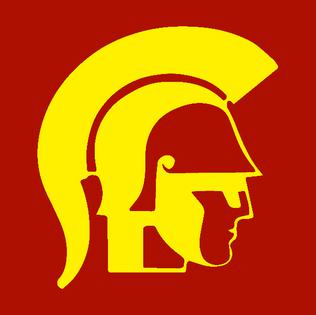 W
WThe USC Trojan Marching Band, also known as the Spirit of Troy, represents the University of Southern California (USC) at various collegiate sports, broadcast, popular music recording, and national public appearance functions. It is particularly connected with the USC football team.
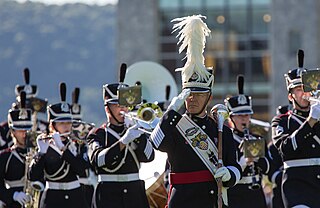 W
WThe West Point Band is the U.S. Army's oldest active band and the oldest unit at the United States Military Academy, traces its roots to the American Revolutionary War. At that time, fifers and drummers were stationed with companies of minutemen on Constitution Island, across the river from West Point. In 1778, General Samuel Holden Parsons' 1st Connecticut Brigade crossed the Hudson River and established West Point as a permanent military post. After the American Revolution, Congress disbanded most of the Continental Army, but "the 55 men at West Point", members of the 2nd Continental Artillery, remained as they were. Among their ranks stood at least one drummer and one fifer, who alone maintained the tradition of military music at West Point.
 W
WThe Yale Precision Marching Band is the official marching band of Yale University. It is a scatter band, as distinct from university marching bands that emphasize precise movements and geometric field formations. Band members refer to themselves as "The Members Of...", which is derived from their introduction at Yale events.